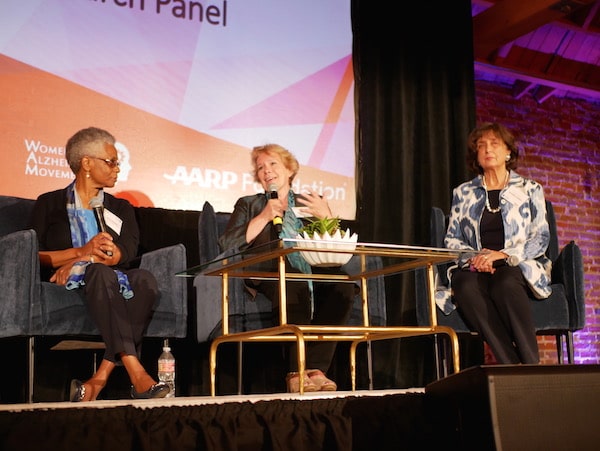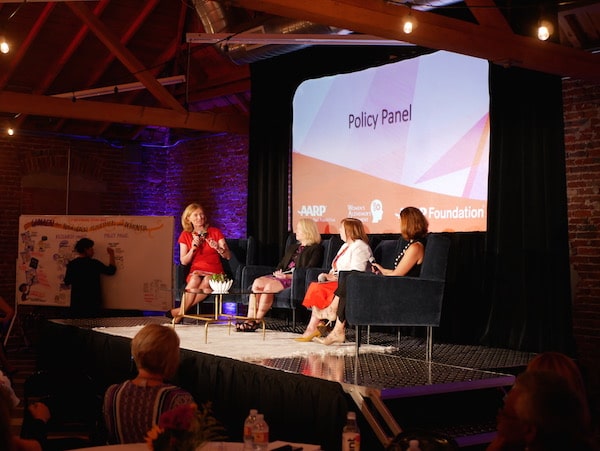BY SUSAN PASCAL
On the evening of July 15th, during the prestigious Alzheimer’s Association International Conference in Los Angeles, the Women’s Alzheimer’s Movement (WAM) partnered with AARP and the Global Council on Brain Health for an unprecedented gathering of over 65 top leaders in Alzheimer’s research, advocacy, and policy for an in-depth strategy session on the topic of women and Alzheimer’s. The group convened to evaluate the state of scientific research and public policy as it pertains to women and Alzheimer’s, with the aim of identifying areas that need either increased focus or a new approach.
“Everywhere I go, people are stunned to learn that Alzheimer’s disproportionately impacts women,” said WAM founder Maria Shriver. “We need to work together to figure out why that is. Women are at the epicenter of this crisis, which is why we must be at the heart of the solution. What’s promising is that there are many female Alzheimer’s researchers and thought leaders who are helping to lead the way. That tells me we’re on track for women to be a part of history when we wipe out this disease once and for all.”
There were two primary panels, one moderated by Shriver on the state of women-based Alzheimer’s research; the other by AARP’s Sarah Lock, Senior Vice President for Policy and Brain Health, on public and corporate Alzheimer’s policy. While both panels included superstars in the fields they represented, the purpose of the evening was to instigate a lively and interactive exchange between panelists and the audience of esteemed experts. It succeeded by generating as much commentary from the audience as the panel.
Framing the discussion of professional experts were two key voices who understand this disease on a poignantly personal level. The first was the incredible Dr. Rev. Cynthia Huling Hummel, who reminded everyone about the importance of including those living with the disease when making decisions about priorities in research and public policy. You can hear her powerful story here of being diagnosed with early-onset Alzheimer’s.
And speaking on behalf of caregivers around the world was the eloquent Donna Rand, whose husband was the former CEO of AARP and passed away of Alzheimer’s in 2018 at the age of 74. She is one of the 16 million caregivers in this country whose lives are turned upside down when they become a caregiver for a loved one with the disease. Watch her moving story here.
Maria Shriver with Super Stars in Women-Based Alzheimer’s Research:
 Maria’s Panel from left to right Marie Bernard, Reisa Sperling MD, Roberta Brinton PhD
Maria’s Panel from left to right Marie Bernard, Reisa Sperling MD, Roberta Brinton PhD
Roberta Brinton of University of Arizona (whom WAM supports in her work on the role estrogen plays in putting women at higher risk for Alzheimer’s) said, “women are not getting the disease more often than men because they live longer, but because they undergo perimenopause beginning in their 40s, causing a shift in brain chemistry.” This transition can impact the ability of the brain to function, creating a dramatic decline in cognitive abilities.
Reisa Sperling, from Brigham and Women’s and Harvard, is an expert on understanding the nature of tau and amyloid, or plaques and tangles, as most people call the hallmark symptoms of a brain affected by Alzheimer’s. Sperling said that the problem with current research has been that trials are being implemented at the wrong time when the illness has already progressed. “So just like heart disease, cancer, and diabetes … we’re going to win by looking much earlier.”
Marie Bernard, Deputy Director of the NIA and the woman who helps decide where the NIA will spend many of its research dollars, spoke on the disparity of the disease on women and communities of color. “The hope is in the acceleration that has occurred in the last many years,” said Bernard. “In 2013, we had $600 million that was devoted to Alzheimer’s research. It’s $2.3 billion now … and we’ve had a real explosion in discovery.”
Sarah Lock with the Leading Activists in Alzheimer’s Public and Corporate Policy:
 Sarah’s panel from left to right: Sarah Lock, Nora Super, Fiona Carragher, Jill Lesser
Sarah’s panel from left to right: Sarah Lock, Nora Super, Fiona Carragher, Jill Lesser
Jill Lesser, the Director of Women Against Alzheimer’s and our WAM partner in the effort to educate women on the need for brain health, focused on the importance of paid leave. “Over the past five weeks, there have been paid leave bills passed in five states, and the work that’s going on is more than just parenting, it’s very much about this population … and we’re starting to change,” she said. “It’s very empowering because this is going on at a national level.”
Nora Super, the Director of the Milken Institute on the Future of Aging, stressed that, as a nation, we need to focus and fund social supportive services as much as we do medical care. “This can really, really improve lives,” she said.
Fiona Corragher, the Chief Policy and Research Officer of the U.K.’s Alzheimer’s Society, said that the stigma surrounding people with dementia and Alzheimer’s is a global one, which is why the U.K. has pioneered several dementia-friendly initiatives. For example, there are nearly three million people who have been trained as “dementia friends,” volunteers who encourage others to make positive differences to people living with dementia in their communities.
A joint WAM/AARP report will be released in 2020.

